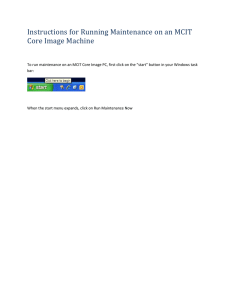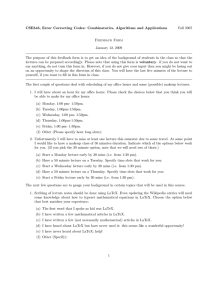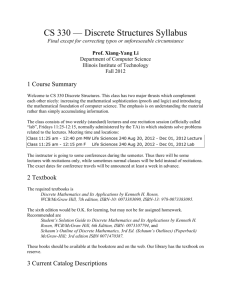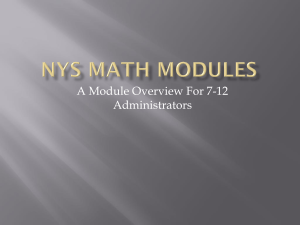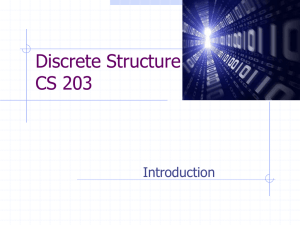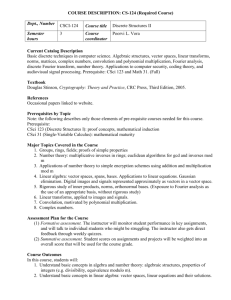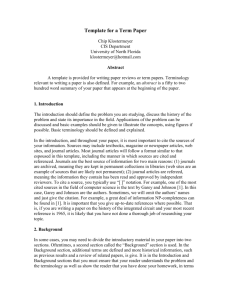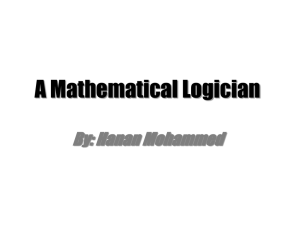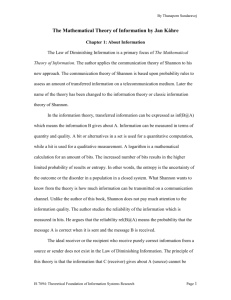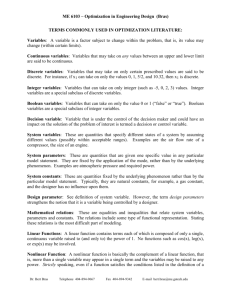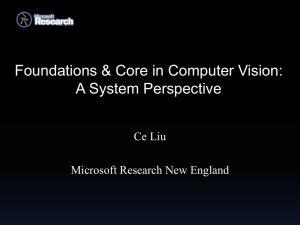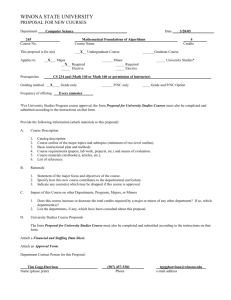Discrete math and where is it used
advertisement
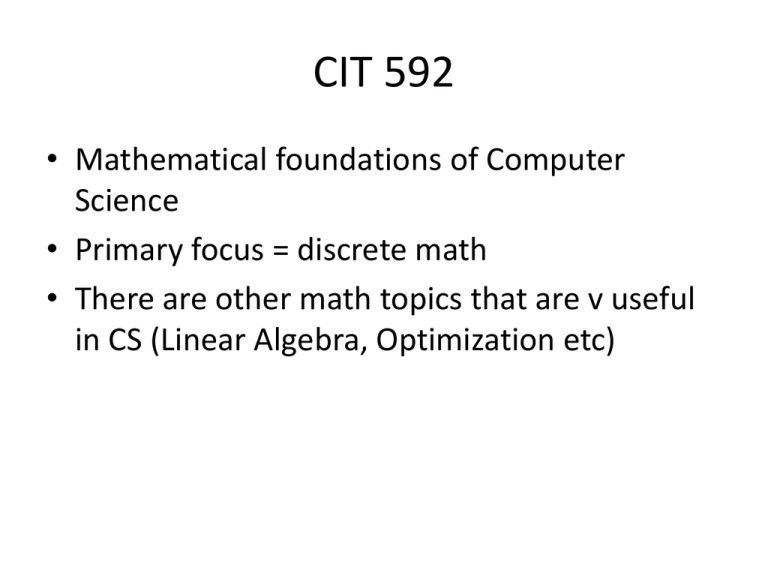
CIT 592 • Mathematical foundations of Computer Science • Primary focus = discrete math • There are other math topics that are v useful in CS (Linear Algebra, Optimization etc) Topics • • • • • • • Sets Permutations and Combinations Discrete Probability and Expectations Logic/Proofs Mathematical Induction Basic analysis of algorithms Graph Theory Math is needed for programming? Perhaps the most commonly asked question in both 592 and 596 is … ‘Where will I use this????’ Think of these topics as tools in your toolbox. Tools in toolbox(??) • But I thought the computer was the only tool I needed! • Computers are dumb. They need humans to think for them • Math gives you the structured approach that is most directly associated with the way computer programs/algorithms are written Sets • Databases SELECT EMP_ID, LAST_NAME FROM EMPLOYEE_TBL WHERE LAST_NAME = ‘Smith'; All employees the Smiths Logic • Day to day logical reasoning does incorporate aspects of ‘formal logic’ – All 592 students are in MCIT – All MCIT students meet Dr. Dave – Therefore Dr. Dave will know about any 592 student I talk about …. • You can greatly simplify code if you can simplify logical statements. • Imperative for digital circuit design Mathematical proof • The most controversial topic taught in this course because … • ‘I’ve never proven anything in the software industry’ • The ability to write a good proof is not too far removed from the ability to write a program with v few bugs • Very useful for an Algorithms course Probability usages • Where is probability used? – Las Vegas, Atlantic City, Monte Carlo, Macau – Making millions and billions on Wall Street – Machine learning – Randomized algorithms (and losing) • what is the ‘expected’ running time of quicksort Counting/combinatorics usages • How long is my program going to take? – Anyone can write inefficient code – A good programmer is able to analyze their program • Analysis of programs almost always begins with having some idea of the ‘number of operations’ • Larger the data, longer the time taken. But how does it scale? Mathematical induction • Breaking up a problem into smaller problems • Use the smaller problem solutions to solve the big problem • When used in proofs = induction • When used in programming = recursion! ‘Recursion is divine!’ Graph Theory • Graph theory + probability + 2 PhD students + the internet = …. • Google maps – What is the shortest route from point A to point B? • Any social networking site will have to use graph theory. Administrivia • Instructor office hours (Levine 268) – Thursday 3pm – 4pm – Monday 10:30 am – 11:30 am – Anyday in the morning before 10:30 am (I get to work by 8am) • TA office hours – Sitong Zhou – Anne Woepse Book • The zybook is mandatory! – Sign up at zybooks.zyante.com – Enter zyBook code: UPennCIT592DiscMathFall14 – Subscribe using any credit card. • Discrete Mathematics with Applications will be used as a good source of solved examples, exercises - no need to buy the book. • I will type up basic notes for each class and post them on canvas • Relevant portions of DMA will be scanned and put on canvas • You should not have to type/write furiously during the lecture. Grading • • • • • • 2 midterms ( 2 x 15 % = 30%) Final – 25 % HW – 40% Participation – 5% Expect HW every week (except for this one) Sometimes HW will clash with other things. Sorry but time management is part of growing up. HW submission • Only Latex • http://en.wikibooks.org/wiki/LaTeX • Latexlab.org allows you to get started with just a google account • Writelatex.com • Useful to have a local installation as well • At the very least, you will learn LaTex Participation Everyone should get 5/5 unless You consistently miss recitations and You never contribute on Piazza and You never ask/answer a question in class Recitation We tried doing recitation in groups in Spring (CIT 596) Goal is to get more discussion happening among the students Attendance is mandatory simply because I feel the ‘good’ students can help others Start forming study groups! Plagiarism/Cheating • Do not copy anyone else’s solution. • Searching for solutions on the internet does count as cheating. • Collaboration is ok and encouraged at the conceptual level. • CITE YOUR COLLABORATORS • If you work in a study group, cite all members of your group. • Study groups cannot be more than 4 people in size. Waiving the course • If you have seen most of the material before, you can consider waiving the course • Undergrad/grad transcript with a discrete math course • The math course has to be recent enough (last 3 years) • Look at past exams to see if you should be skipping this course • To waive the course, – send me email with proof of your math abilities – If I am convinced, I forward it to Mike Felker Basic math background • This is the only first semester MCIT course that DOES assume something • Basic algebra • Most of you have seen it in some form. Might be rusty. • HW0 is designed to give you practice • Does not contribute to your grade • Please try and do these by yourself. • If it is a struggle, watch the videos • Poll at the beginning of next class Basic math background • We are happy to help bringing you up to speed with the basic math. • It will not be a main part of the course unless the majority of the class struggles with HW0. • We might do an extra class. Might have to be on a weekend. • The algebra shows up a little later in the course, but by then it will be too late to play catch up.
